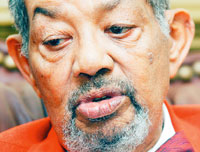Chapter meets to share heroic stories of Tuskegee Airmen
By Renee Carey
Published in News on May 16, 2005 1:45 PM
They were heroes; fighter pilots who never lost a plane.
The only ones.
They brought home 150 distinguished Flying Crosses, Legions of Merit and The Red Star of Yugoslavia.
But Maycie Herrington wants those who remember the 970 Tuskegee Airmen to understand the African-American unit was much more than just a group of distinguished veterans. They were pioneers.
"I think people should realize that the Tuskegee Airmen were the first civil rights fighters," she said. "It is because of them that the armed forces were integrated in 1948."
She ought to know. Mrs. Herrington, the wife of fighter pilot Aaron Herrington, was a part of the Tuskegee project, too, a civilian employee.
She and other members of the original Tuskegee endeavor, as well as their family, friends and admirers, gathered Saturday in Goldsboro to reminisce, share stories and to pass along the history the men and women say is still not part of textbooks.
After a reception and banquet, those in attendance listened to Dr. Stewart "Twiggy" Fulbright, another original Tuskegee Airman, speak of his tour of duty and the accomplishments of the men and women who served alongside him.
Mrs. Herrington, a Long Beach, Calif., resident, was in town visiting her niece, Earline Copeland, who lives in Wilson. She said she has always wanted to be part of the reunions, which the local chapter sponsors once a year.
Family, friends and guests gather to remember and to keep the history alive.

Eagleson
Wilson V. Eagleson lived that history. One of the original fighter pilots under the command of Col. Benjamin O. Davis Jr., he is now the honoree for whom the local chapter of the Tuskegee Airmen is named.
He remembers not only the battles during World War II, but the fight to earn the right to be there in the first place.
Originally from Bloomington, Ind., he now lives in Dudley. The 85-year-old remembers well when he got the flying bug.
"When I was 12 or 13, I got a flight in one of those barnstorming planes," he said.
In 1938, he headed off to West Virginia State College, one of the few black schools that offered flight training for African-Americans.
Then, it was off to try to get a place in the Army Air Corps. Unfortunately, there was little interest in training black pilots, Eagleson said.
"There was a lot of prejudice back then. We had to fight just to have the right to die for our country."
So, in 1942, he enlisted.
"It was right after Pearl Harbor," he said. "There were long lines."
Eagleson said he is not sure what really prompted him to sign up to defend his country on the front lines.
"I did not know which was most important, patriotism or my love of flying," he said.
But he knows the stand he and other Tuskegee pilots, bombers and crews took was an important one.
"This is as much my country as anyone else's," he said. "I should have the right to fight and die for it."
He is modest about his accomplishments, although he was part of several major sorties that ended in the destruction of German aircraft, he talks instead of the bravery of all the men who served.
He does, however, remember how he felt after he came back from his first mission, thrilled to have shot down an enemy plane.
Then, he said, he realized what he had done, and his attitude changed about his missions.
"I had just done something that I was taught not to do, take a human life," he said. "After that, it was just a job we had to do."
He is also quick to point out that there were others who served. Women handled ground crew duties and also assisted with other tasks. They are the unsung heroes, he said.
"A lot of people do not realize how many women served," he said.
Mrs. Herrington agrees the stories of the Tuskegee pilots, bombadiers and ground crews are vital living history that needs to be passed on to future generations. She is busy writing a book of her own about the experience.
"This is not in the history books, but we are making sure the stories are shared with the children," she said. "This is an important story that needs to be told."
Eagleson's son, Gerald, now 56, himself a decorated retired U.S. Army medic, said he did not realize the extent of his father's accomplishments or the Tuskegee Airmen's story until he was an adult.
Military children are used to not knowing the details of their parents' missions. So, it was not until later that he learned just how significant a part his father played in his ability to serve.
"The struggle itself to accomplish what they did was significant," he said. "They had to fight before just to be able to do what they did."
He will make sure his children -- Eagleson's grandchildren -- know the stories when they are old enough.
"This is history and something to be proud of," he said.
